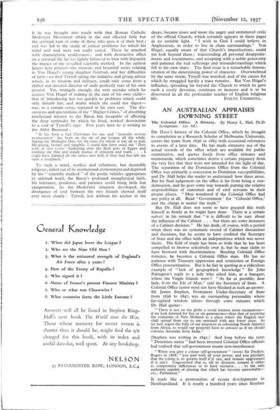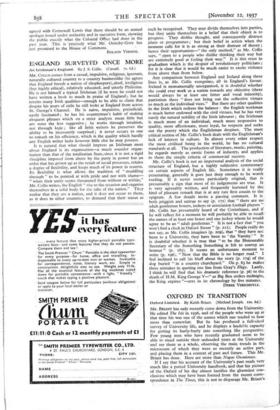AN AUSTRALIAN APPRAISES DOWNING STREET
The Colonial Office. A History. By Henry L. Hall, Ph.D. (Longmans. its. 6d.)
DR. HALL'S history of the Colonial Office, which he brought to completion as a Research Scholar of Melbourne University, covers the years from 1836 to 1885 with occasional references
to events of a later date. He has made extensive use of the actual records of the office which are available for public examination, and quotes freely from office minutes and memoranda, which sometimes derive a certain piquancy from the very fact that they were not intended for the light of day.
The separation of the Dominions Office from the Colonial Office was primarily a concession to Dominion susceptibilities, and Dr. Hall helps the reader to understand how these arose.
But his final judgement on the office is far from being a con- demnation, and he goes some way towards putting the relative responsibilities of statesmen and of civil servants in their proper places. " Men wondered if the Colonial Office had any policy at all. Read ' Government ' for ' Colonial Office,' and the charge is nearer the truth."
But Dr. Hall does not seem to have grasped this truth himself as firmly as he might have done. There is a certain naivete in his remark that " it is difficult to be sure about
the influence of the Cabinet . . . but there are some instances of a Cabinet decision." He has dealt, of course, with a period when there was no systematic record of Cabinet discussions and decisions, but he seems to have credited the Secretary of State and the office with an independence which was never theirs. His field of study has been so wide that he has been compelled to browse selectively over it,. but he may claim to have browsed with discrimination. Reading Colonial Office minutes, he becomes a COlonial Office man. He has no patience with Treasury oppression and restriction or Foreign Office procrastination. But is he fair in quoting as a ridiculous example of " lack of geographical knowledge " Sir John Pakington's reply to a lady who asked him, at a banquet, where the Virgin Islands were ? "As far as possible, dear lady, from the Isle of Man," said the Secretary of State. A Colonial Office junior need not have blushed at such an answer. Sir James Stephen, Permanent Under-Secretary of State from 1836 to 1847, was an outstanding personality whose far-sighted wisdom shines through some minutes which Dr. Hall quotes :
" There is not on the globe a social interest more momentous— if we look forward for five or six generations—than that of reserving the continent of New Holland as a place where the English race shall spread from sea to sea unmixed with any lower caste. As we now regret the folly of our ancestors in colonising North America from Africa, so would our posterity have to censure us if we should colonise Australia from India."
(Stephen was writing in 1841.) And long before the term " Dominion status " had been invented Colonial Office officials had realised that self-government meant non-interference.
" When you give a colony self-government " (wrote Sir Frederic Rogers in 1868) you part with all your power, and you proclaim that the colony is to govern itself if it can, and remain ungoverned if it can't. Ungoverned that is, till its disasters compel it either to compromise differences or to have recourse . . . to the only authority capable of altering that which has become unworkable-- viz., Parliament."
It reads like a premonition of recent developments in Newfoundland. It is nearly a hundred years since Stephen agreed with Cornewall Lewis that there should be an annual apologia issued under authority and in narrative form, showing the public exactly what the Colonial Office had done in the past year. This is 'precisely what" MI. Orinsby-Gore has just promised to the House of Commons.
ROLAND VERNON.















































 Previous page
Previous page